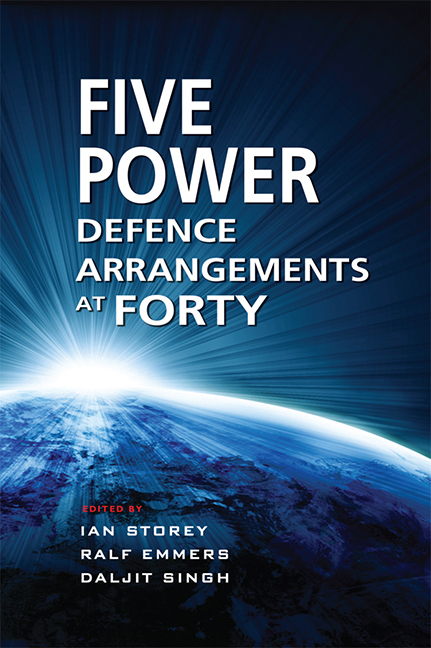Book contents
- Frontmatter
- Contents
- Contributors
- Foreword
- Glossary
- Introduction
- 1 A Little Ray of Sunshine: Britain, and the Origins of the FPDA – A Retrospective on Objectives, Problems and Solutions
- 2 On the Establishment of the Five Power Defence Arrangements
- 3 Malaysian Foreign Policy and the Five Power Defence Arrangements
- 4 The Five Power Defence Arrangements Exercises, 2004–10
- 5 The FPDA's Contribution to Regional Security: The Maritime Dimension
- 6 An FPDA Role in Humanitarian Assistance and Disaster Relief?: It's More than Just the Armed Forces
- 7 A Quasi-Pact of Enduring Value: A Malaysian Perspective of the FPDA
- 8 The FPDA and Asia's Changing Strategic Environment: A View from New Zealand
- 9 The Future of the FPDA in an Evolving Regional Strategic Environment
- Index
7 - A Quasi-Pact of Enduring Value: A Malaysian Perspective of the FPDA
Published online by Cambridge University Press: 21 October 2015
- Frontmatter
- Contents
- Contributors
- Foreword
- Glossary
- Introduction
- 1 A Little Ray of Sunshine: Britain, and the Origins of the FPDA – A Retrospective on Objectives, Problems and Solutions
- 2 On the Establishment of the Five Power Defence Arrangements
- 3 Malaysian Foreign Policy and the Five Power Defence Arrangements
- 4 The Five Power Defence Arrangements Exercises, 2004–10
- 5 The FPDA's Contribution to Regional Security: The Maritime Dimension
- 6 An FPDA Role in Humanitarian Assistance and Disaster Relief?: It's More than Just the Armed Forces
- 7 A Quasi-Pact of Enduring Value: A Malaysian Perspective of the FPDA
- 8 The FPDA and Asia's Changing Strategic Environment: A View from New Zealand
- 9 The Future of the FPDA in an Evolving Regional Strategic Environment
- Index
Summary
Far from being a mere relic of the Cold War, the Five Power Defence Arrangements (FPDA), has survived four decades since its inception in 1971. It may be argued, as its principal protagonists do, that it has constantly been “re-tooled” to meet the changing challenges of Southeast Asia's security landscape. In the post-9/11 period, more importance has been accorded to the threat of terrorism, and more recently, to Non-Traditional Security (NTS) issues. However, the bulk of FPDA military exercises and the operation of Integrated Air Defence System (IADS) of Peninsular Malaysia and Singapore, now broadened to area defence, reflect more traditional security concerns.
The FPDA's Relevance and Durability
In assessing its present status and future direction, it is germane to consider the raison d'etre of the FPDA in relation to the central security concerns of its principal actors, namely Malaysia, Singapore and Australia. The other two members, Britain and New Zealand, are more “peripheral”, albeit committed to the FPDA. Students of international security argue that since the end of the Cold War and the concomitant demise of bipolar rivalry between the United States and the former Soviet Union, the threat of military conflict and major inter-state war has diminished. In Southeast Asia, with the advent of the Association of Southeast Asian Nations (ASEAN) and its gradual transformation to encompass all ten of the region's states, the danger of inter-state war has also been deemed to be remote. In view of these factors, critics have postulated that the FPDA is an anachronism that should have met its demise, perhaps even in its early years.
That the FPDA has survived since 1971 is indicative of its relevance to its three principal actors. It is often overlooked that the FPDA was established at a time of great uncertainty, political turbulence and regional turmoil. For Southeast Asia, the period from the 1940s to the 1970s witnessed war, the tumult of decolonization and the assertion of nationalism of its newly-independent states which were confronted by issues of survival, development and communist uprisings.
- Type
- Chapter
- Information
- The Five Power Defence Arrangements at Forty , pp. 98 - 104Publisher: ISEAS–Yusof Ishak InstitutePrint publication year: 2011

